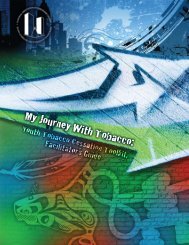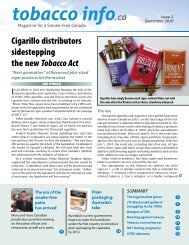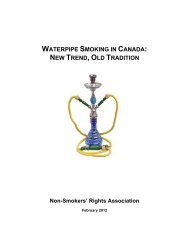Tobacco-Free Sports and Recreation Policies
Tobacco-Free Sports and Recreation Policies - New Brunswick Anti ...
Tobacco-Free Sports and Recreation Policies - New Brunswick Anti ...
You also want an ePaper? Increase the reach of your titles
YUMPU automatically turns print PDFs into web optimized ePapers that Google loves.
<strong>Tobacco</strong>-<strong>Free</strong> <strong>Sports</strong> <strong>and</strong> <strong>Recreation</strong> <strong>Policies</strong><br />
Facilitators<br />
Strong tobacco control advocates within the hockey settings including enthusiastic <strong>and</strong><br />
committed PHU staff <strong>and</strong> youth workers, hockey administrators, players, <strong>and</strong> parents served to<br />
facilitate TFSR policy implementation <strong>and</strong> ongoing promotion. In addition, PHU-led TFSR<br />
promotional activities served to remind all those engaged in the sport of hockey the importance<br />
of sustained tobacco control efforts.<br />
The PHU acted as a conduit for information <strong>and</strong> as an enabler, providing resources, <strong>and</strong> leading<br />
tobacco-free events <strong>and</strong> thereby increasing the feasibility of TFSR policy implementation at the<br />
local level. This evaluation demonstrates that without committed PHU support, the<br />
implementation of the TFSR policy would not have achieved its many successes to date. In<br />
addition, all cases confirmed that involvement in this evaluation, through the local PHU contact<br />
person, has stimulated awareness <strong>and</strong> an important return <strong>and</strong> review of TFSR issues.<br />
TFSR signage <strong>and</strong> advertising also served as a key strategy to sustain the TFSR policy <strong>and</strong><br />
messaging across the four case studies. Innovative messaging also resonated among the case<br />
studies (e.g., tailoring messages to younger children in the Peewee/Bantam teams). TFSR<br />
events, signage, logos, the designated smoke-free areas (nine metres drawn with chalk) all<br />
stimulated TFSR messaging <strong>and</strong> kept consistent, key messages alive in each hockey setting.<br />
Players further facilitated TFSR policy implementation when they shared the policy with family<br />
members. This in turn, reiterated the importance of parents as role models to youth. Although<br />
the actual TFSR policy may not have been central in the minds of Case Study I participants, the<br />
awareness of related messaging had continued throughout other PHU-led events <strong>and</strong> across<br />
other hockey <strong>and</strong> sport settings in the community.<br />
Overall, across all case studies, it would appear that hockey <strong>and</strong> sport more broadly effectively<br />
serves as a protective force against engagement in tobacco product use. For all the players,<br />
cardiovascular levels <strong>and</strong> stamina were cited as key reasons to avoid cigarette smoking. For the<br />
Peewee <strong>and</strong> Bantam players, sport is viewed as a venue that is healthy <strong>and</strong> provides them with a<br />
physical outlet away from the dangers of tobacco <strong>and</strong> other harmful products <strong>and</strong> associated<br />
behaviours.<br />
Ontario <strong>Tobacco</strong> Research Unit 61





